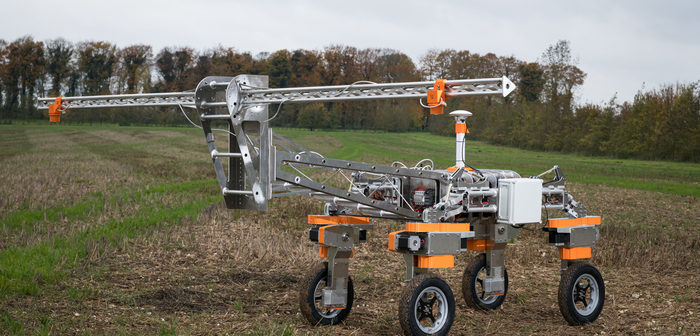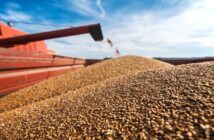Farming is a $2.4 trillion global industry at the threshold of tremendous transformation. How we farm is about to change forever. This is the fourth agricultural revolution: and with British ideas, technology and policy at the vanguard. Sam Watson Jones of Small Robot Company explains.
The Fourth Agricultural Revolution will transform farming worldwide: and is a global opportunity both for British farming and agritech. It will make it at the same time easier to protect the natural environment while also producing food, which is both affordable and high quality. These changes will not only help UK farmers remain competitive in an increasingly global market; it will also bolster food security in Britain and abroad.
In a post-Brexit trading environment increased productivity will be vital to help farmers survive possible export tariffs ranging from 42 per cent to 87 per cent. Under these conditions, farmers could see their incomes decline and profits slump if productivity lags behind competitors. As Britain embarks on a new era economically, one of its oldest industries will be dragged along with it.
Technology has transformed many industries – and now is the time for the agricultural industry, which has struggled to modernise over the last few decades. Agritech has made enormous strides recently, bringing new possibilities for improving the sustainability and efficiency of agriculture, and fundamentally changing what is even possible on the farm.
The time is ripe for transformative systemic change – if not revolution – and the new Agriculture Bill is well-positioned to be the catalyst. As Tony Juniper, head of Natural England, commented in response to the Bill, “We are at a pivotal moment.” I very much agree. The Government’s move is potentially game-changing for agriculture, rewarding environmental improvements while also placing firm focus on productivity.
It’s also highly aligned with environmental policy. Britain is the first major economy to sign up to be a Net Zero economy by 2050. The NFU has risen to the challenge, committing farming to be Net Zero by 2040. This will necessitate a significant shift in land use. The new Agriculture and Environment Bills, as well as the Committee for Climate Change Land use: Policies for a Net Zero UK report, now set out the future direction, also seeking to spur sustainability and productivity in the decades ahead.
It’s now time for us to work together to create a more ecologically-harmonious farming model. And farming urgently needs to change. We’re failing environmentally – and also economically. Crop productivity for the major world crops has flatlined for at least 20 years. The aha moment for me was about six years ago. I remember very clearly sitting in my farm office looking at the books and it dawning for me that my farm did not have a future unless we could fundamentally change the very farming system itself.
The new focus on promoting soil health is particularly important. We need to develop farming systems that can regenerate soil health at scale. Protecting the soil for future generations is critical for food security.
What’s encouraging here is that agriculture is already shifting from intensively managing the soil to regeneratively managing the soil. To some extent the new government policy is a reflection of the changing mindset. At Small Robot Company, we are already seeing this prioritisation of soil health and carbon sequestration across the country. This is a common theme among the farmers who have joined us as customers, supporters and investors.
Farmers are integral to the environmental solution. The Agriculture Bill will ensure that this effort can now be rewarded – and quite rightly. But as ever, the devil will be in the detail: the implementation in particular needs careful attention. Highly trusted and highly detailed data is central to the Agriculture Bill being a success. What gets measured, will get done.
However, the government will need to cut the ‘green tape’ if it’s to be a success. Currently, the set up and management of those schemes is paper-based. It is hugely complex, bureaucratic and labour intensive; a huge disincentive for farmers to join. If farmers are going to take part in an expanded system, this whole process needs to be streamlined and digitised.
Crucially, for a policy that focuses on soil health to work effectively, we will need technology in place that can measure what is happening on farms across the country. This is essential to ensure the policy has the intended impact at scale: developing a trusted system of measurement is prerequisite. We need a much more consistent and accurate system in place than those we currently have available for soil measurement.
At Small Robot Company, we have a focus on working to become part of this solution. We’re looking to create a consistent framework to measure the chemistry, physics and, perhaps most crucially, the biology of our soils in a repeatable and reliable way. We can already deliver a highly precise per plant viewpoint with our autonomous robots. Next, we are working to bring this precise view to the soil, with a level of detail far in excess of current best practice. Our objective is to take at least five contact measurements per hectare, refined by continuous sensor data.
In addition, we need a cross-industry initiative to create the baseline. The data will always be variable – and somewhat untrusted – with anything that needs manual, human measurement. Problematically, we cannot even trust today’s technical measurements: current tracking methods are very limited. Moreover, there is huge variation among them: we do not yet have like-for-like data to compare. It’s all apples and pears. There are myriad differing sensors, all incompatible, which therefore cannot even communicate with each other, let alone exchange or compare data. Hard and fast conclusions are impossible to draw. No-one has yet conducted research into this variation in any detail. We cannot yet assign any meaningful value or get a continuous view. This is the new Wild West.
As such, a number of current initiatives to measure and reward carbon capture are underway. Particularly to be commended is Indigo Ag’s Terraton project. This is seeking to remove one trillion tons of carbon, reversing concentration levels back to the time of the pre-Industrial Revolution. Farming is key to this solution, and with this put in place, reward schemes such as carbon trading could be a huge opportunity for farmers.
Agriculture is the industry for the future. As a farmer, I’m extremely excited to be working within – and shaping – the industry at such a seminal time. It’s a world of opportunity.



